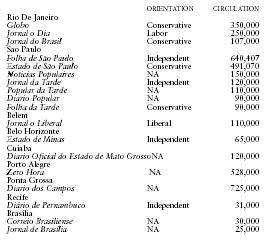Brazil - Media
The principal telegraph network is operated by the Brazilian Postal and Telegraph Administration, in which the government holds part ownership. National trunk routes and international connections are also operated directly by another mixed corporation, the Brazilian Telecommunications Corp. (EMBRATEL), which inaugurated an earth satellite station in 1969 linking the Brazilian network with member countries of INTELSAT. EMBRATEL has rapidly modernized and extended the domestic telecommunications system with the introduction of microwave networks, including long-distance direct dialing, throughout much of the country. In the Amazon region, the company relies on a tropodiffusion system because of the area's large empty spaces. As of 1997 there were 17 million mainline telephones in use with an additional 4.4 million cellular phones in use.
Brazil has one of the largest television broadcasting systems in the world. As of 1999, Brazil had 1,365 AM and 296 FM radio stations. In 1997, there were 138 television stations. In 2000 there were about 433 radios and 343 television sets for every 1,000 people. The same year there were about 50 Internet service providers, serving 11.9 million subscribers by 2001.
As of 2002, there were over 300 daily newspapers published in Brazil. The following table shows Brazil's leading daily newspapers, with their political orientation and estimated 2002 circulation:

| ORIENTATION | CIRCULATION | |
| Rio De Janeiro | ||
| Globo | Conservative | 350,000 |
| Jornal o Dia | Labor | 250,000 |
| Jornal do Brasil | Conservative | 107,000 |
| Sao Paulo | ||
| Folha de São Paulo | Independent | 640,407 |
| Estado de São Paulo | Conservative | 491,070 |
| Noticias Populaires | NA | 150,000 |
| Jornal da Tarde | Independent | 120,000 |
| Popular da Tarde | NA | 110,000 |
| Diario Popular | NA | 90,000 |
| Folha da Tarde | Conservative | 90,000 |
| Belem | ||
| Jornal o Liberal | Liberal | 110,000 |
| Belo Horizonte | ||
| Estado de Minas | Independent | 65,000 |
| Cuiaba | ||
| Diario Oficial do Estado de Mato Grosso | NA | 120,000 |
| Porto Alegre | ||
| Zero Hora | NA | 528,000 |
| Ponta Grossa | ||
| Diario dos Campos | NA | 725,000 |
| Recife | ||
| Diário de Pernambuco | Independent | 31,000 |
| Brasília | ||
| Correio Brasiliense | NA | 30,000 |
| Jornal de Brasília | NA | 25,000 |
The largest Brazilian-owned magazine, which competes with the Portuguese-language edition of the Reader's Digest, called Selecões, is the popular illustrated Manchete of Rio de Janeiro (1995 circulation 100,000).
Freedom of the press is guaranteed under the constitution of 1967 and no license is required for the publication of books, newspapers, and periodicals. However, under the newspaper code of 19 September 1972, newspapers were forbidden to publish "speculative" articles on politics or unfavorable reports on the economy. The interests of Brazilian journalists are defended by the Inter-American Press Association and the influential Brazilian Press Association. Newspaper staffs have traditionally enjoyed privileged status and exemption from income taxes; nevertheless, in the early 1970s, reporters were sometimes subject to arrest and alleged brutalities at the hands of the government. In 1979, practically all restrictions on the press were lifted.
Comment about this article, ask questions, or add new information about this topic: